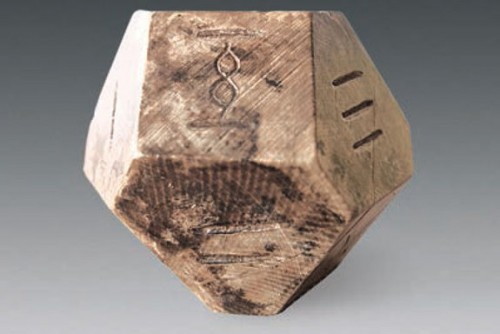Welcome to Purple Pawn, covering games played around the world by billions of people every day.
Ancient Chinese Board Game Discovered Left Behind in Looted Tomb
17 Nov
Posted by David Miller as Classic Board Games

A 14-sided die and game pieces were found by archaeologists in a 2,300 year-old Chinese tomb. According to an article in the journal, Chinese Cultural Relics, the pieces are believed to be for the board game, Bo (also known as Liubo), which has not been played in 1,500 years and for which the rules are long forgotten.
The die found is carved from animal-tooth and inscribed with the numbers 1-6 twice. Two additional faces of the die are blank. Along with the die were found 21 numbered tokens and a broken tile that comprised part of the board. [Images of additional game pieces can be viewed at Live Science.]
The tomb structure in which these game pieces were discovered served as a burial place for aristocrats from the ancient state of Qi. Over the years, it has been extensively looted. Archaeologists have identified 26 different shafts dug in to the tomb. One contained a curled-up skeleton, possibly one of the grave robbers.
No Comments
Sorry, the comment form is closed at this time.
Trending
- Massdrop.com
- Oh the Irony—Illuminati Card Game Continues to Inspire Conspiracy Theorists
- Home
- Footprints, an Educational Ecology Game
- USPS Adds Board Game Flat Rate Box
- Baila, the Estonian Drinking Card Game
- Crystal Caste Wins Dice Patent Suit Against Hasbro
- Mirror Game, Red and Blue
- Are Board Games Dangerous?
- The Truth About Dominoes On Sunday in Alabama
Archives
Most Popular Articles
- Oh the Irony—Illuminati Card Game Continues to Inspire Conspiracy Theorists
- The 20 Most Valuable Vintage Board Games
- The Truth About Dominoes On Sunday in Alabama
- Sequence Game, and Variants
- USPS Adds Board Game Flat Rate Box
- Baila, the Estonian Drinking Card Game
- The 13 Most Popular Dice Games
- Are Board Games Dangerous?
- Guess Who? The Naked Version
- What Happened to the Jewel Royale Chess Set?
Recent Posts
- Toy Fair 2019—Breaking Games
- Talisman Kingdom Hearts Edition
- Toy Fair 2019—Winning Moves
- Toy Fair 2019—Games Workshop
- Toy Fair 2019—Star Wars Lightsaber Academy
- Toy Fair 2019—Stranger Things Games
- Toy Fair 2019—HABA
- Licensing Roundup
- Game Bandit
- 2018 A Difficult Year For Hasbro But Not For D&D Or MtG
Recent Comments
- on Toy Fair 2019—Winning Moves
- on Game Bandit
- on Second Look—Dungeons & Dragons Waterdeep Dragon Heist
- on Crowdfunding Highlights
- on Beyblade SlingShock
- on Game Bandit
- on Game Bandit
- on Watch This Game!, the Board Game Review Board Game
- on Second Look—Vampire: The Masquerade 5th Edition
- on Palladium Books Loses Robotech IP License, Cancels Five-Year-Overdue Robotech RPG Tactics Kickstarter




